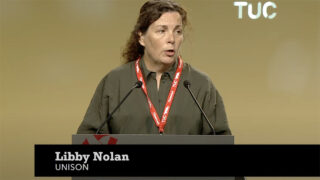More than a million families with a household income below £30,000 are in extreme debt, and ongoing wage stagnation is making the problem worse, according to a new report published today (Tuesday) by the TUC and UNISON.
The report, Britain in the Red, finds that total unsecured debt (which excludes mortgages) for UK households rose by £48bn between 2012 and 2015 to reach £353bn.
The report looks at how this debt is distributed, finding that millions of households are struggling with high repayment rates relative to their income:
- two million households are in ‘problem debt’ – defined as paying out more than 25% of their gross household income on unsecured debt repayments (3.2m is equivalent to 1 in 8 households.)
- six million households are in ‘extreme problem debt’ – defined as paying out more than 40% of their gross household income on unsecured debt repayments (1.6m is equivalent to 1 in 16 households.)
Many low-income households are under particularly severe pressure. Of the 1.6 million households in extreme problem debt, it is estimated that 1.2 million have a household income below £30,000.
For low-income households in employment, extreme problem debt is growing fast. In 2015 9% of low-income households in employment were in extreme problem debt, nearly doubling from 5% in 2014.
The TUC and UNISON are concerned that the numbers affected by problem debt are set to continue increasing. Bank of England figures show that consumer credit, which makes up the main part of unsecured debt, is now growing at an annual rate of 10%. This is the highest growth rate for more than a decade.
The mountain of unsecured household debt has been fuelled by a collapse in the value of wages. OECD figures show UK real wages declined by 10.4% between 2007 and 2015. This means that, even though household debt has not grown every year since the crash, and has not yet reached pre-crash rates, the fall in the real value of wages has made it harder for families to service existing debt.
UNISON General Secretary Dave Prentis said: “Many of those affected by debt will be public service workers who have suffered eight years of zero pay rises, followed by a government imposed cap on earnings.
“This report rightly draws a link between increased debt and stagnant wage growth at a time when rent and transport costs continue to rise. Many families are having to make choices between paying the rent and feeding their kids.”
TUC General Secretary Frances O’Grady said: “Families can’t continue relying on credit cards and loans to get by. But with the average wage still worth £40 less than before the 2008 crash, lots of families have little choice.
“Higher wages must be at the heart of the government’s economic plan. We need a return to proper year-on-year pay rises, and a higher national minimum wage.
“And we need public investment in major infrastructure projects to create more well-paid jobs and build a stronger economy.
“The government must also do more to help low-income families struggling with problem debt in getting access to debt restructuring and insolvency support.”
UNISON General Secretary Dave Prentis said: “Many of those affected by debt will be public service workers who have suffered eight years of zero pay rises, followed by a government imposed cap on earnings.
“This report rightly draws a link between increased debt and stagnant wage growth at a time when rent and transport costs continue to rise. Many families are having to make choices between paying the rent and feeding their kids.”
NOTES TO EDITORS:
– The TUC report Britain in the Red: The report was written for the TUC and UNISON by Damon Gibbons from the Centre for Responsible Credit, and can be found at www.tuc.org.uk/sites/default/files/Britain-In-The-Red-2016.pdf
– Unsecured debt: Unsecured debt includes debts like credit cards, bank loans, payday loans and student loans, but does not include mortgages. It previously peaked at £364bn in 2008, then fell in the recession. The increase since 2012 is in part due to the major extension of student loans. These figures include student debts. However, while student loans have increased the total unsecured debt of UK households, the favourable repayment rates for student loans mean this has not made a significant difference to the number of households classified as having ‘problem debt’ or ‘extreme problem debt’.
– Consumer credit: Consumer credit is unsecured debt excluding student loans and ‘other accounts payable’. It peaked in 2008 at £230bn, fell back to £184bn in 2012, but had risen again to £212bn by the end of 2015. The Bank of England publishes figures for consumer credit each month (but only from UK not overseas banks and building societies).
– Affordability of debt: Conventional measures of the cost of servicing debt, which only look at the level of interest payments relative to gross incomes, do not take into account the rise in the cost of living since 2008. Once this is factored in, it is apparent that the consumer credit interest burden on households has never been greater. The TUC is calling on policy makers to consider a wider range of measures when assessing indebtedness and to set targets for reducing debt.
– Low income families and problem debt: The figure of 1.2m low-income families being in extreme debt is based on 49.6% of households having incomes of less than £30,000 (Family Resources Survey 2014/15 Table 2.5) applied to ONS household data (ONS household projections live table 401) to give a total of 13.7 million households – of which 9% is 1.2 million.
– UK wages: OECD figures show UK real wages declined by 10.4% between 2007 Q4 and 2015Q4. This was the largest decline of all advanced economies, equalled only by Greece. For more information see www.tuc.org.uk/economic-issues/labour-market/uk-workers-experienced-sharpest-wage-fall-any-leading-economy-tuc
– All TUC press releases can be found at www.tuc.org.uk
– Follow the TUC on Twitter: @The_TUC and follow the TUC press team @tucnews
– Congress 2016 will be held in the Brighton Centre from Sunday 11 September to Wednesday 14 September. Free media passes can be obtained by visiting www.tuc.org.uk/MediaCredentials2016 and completing an online form. Applications must be in by noon on Tuesday 23 August. Any received later than that will be processed in Brighton and will cost £75.
Contacts:
Media enquiries:
Tim Nichols T: 020 7467 1388 M: 07808 761844 E: tnichols@tuc.org.uk
Michael Pidgeon T: 020 7467 1372 M: 07717 531150 E: mpidgeon@tuc.org.uk
Elly Gibson (Mon to Thurs) T: 020 7467 1337 M: 07900 910624 E: egibson@tuc.org.uk
Damon Gibbons T: 07961 869473 E: Damon.Gibbons@learningandwork.org.uk



